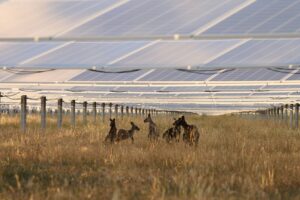How good’s the cricket? Australia thrashed Pakistan and is all over New Zealand. David Warner’s scoring at will, Marnus Labuschagne is emerging as a new batting superstar, and Steve Smith is taking unbelievable catches.
Enough, prime minister Scott Morrison wants us to think, to take our mind off the drought, the soaring heatwaves, the horrific bushfires, the suffocating smoke – the ashes of living things, plants and animals, incinerated in the inferno – the dangers to our health and the fear for our own and our children’s future.
Morrison’s Orwellian trope was born on the night of the federal election victory where he invoked the image of the “quiet Australian”.
It was not immediately clear whether this was just a thank you, or an instruction. It is increasingly obviously the latter. Unless you’re the Murdoch media shouting in his ear, or donors or business backers, Morrison’s Coalition doesn’t want to hear from you. The rest of you can shut up and watch the cricket.
Let’s hope that Smith can take another couple of great catches, that Marnus can belt out more centuries. What is clear from the past two weeks in Madrid is that a rise of 1°C in average global warming, or even 2.0°C, is not hot enough for Morrison – he’d be happy for global average temperatures to soar to more than 3°C.
How big will the bushfires be then? How dense the smoke? How many million more hectares burned beyond repair? How unbearable the heat of the summers? How terrifying the extreme weather and the fears for the future?
Morrison must be happy about this because these are the inevitable and direct consequence of his specific instructions to the negotiating team at the UN climate talks.
Despite all the warnings from scientists and health experts, the urging from big business and the pleas from activists, Australia strutted the world stage like a climate vandal in ways that hadn’t been seen since the worst of Tony Abbott and John Howard.
Other countries pointed the finger squarely at Morrison. These included France’s former environment minister, Laurence Tubiana, an architect of the Paris climate accord, who describes Australia’s actions – claiming surplus “credits” from the Kyoto agreement to meet nearly the entirety of its weak Paris commitments – as cheating.
“If you want this carryover it is just cheating,” Tubiana told the Financial Times. “Australia was willing in a way to destroy the whole system, because that is the way to destroy the whole Paris agreement.”

Others were equally damning. Costa Rica, which is leading efforts by 80 nations to try to increase ambition, already including the UK and New Zealand, Europe and Australia’s Pacific neighbours, took direct aim at Australia’s actions in the final plenary session.
Morrison was singled out – along with Donald Trump and Brazil’s right-wing leader Jair Bolsonaro – as one the three stooges seeking to destroy hopes that climate action can be advanced.
In Kyoto, remember, Australia held out for a deal that allowed one of the world’s richest countries – unique among western nations – to increase its emissions.
Then it had the hide to refuse to sign the treaty, until Kevin Rudd belatedly did so. Having failed to reduce its emissions in any meaningful way, thanks to the scrapping of the carbon price, Australia now wants to “bank” those emissions for its weak Paris climate targets.
In Madrid, the Australian negotiating team refused to cede any ground. It was under strict orders from Morrison’s office, where the former leaders of Australia’s principal coal lobby have ensconced themselves, to stand firm. It was a shameless attempt to undermine the integrity of the Paris climate deal.
This was not just about Australia’s 1.3 per cent of global emissions. As former negotiator Dean Bialek wrote in the Sydney Morning Herald, Australia’s accounting dodge has prompted other, much bigger polluters to act in kind. India, for instance, now wants Kyoto-era credits counted towards its actions. Brazil is pushing its own accounting tricks on the Amazon rainforest.
So how good will the cricket need to be when the bushfires get hotter and even more intense in a world which has warmed by more than 3°C? Because that, say the scientists, is where we are heading.
The current pledges amount to locking in 3.2°C of average global warming, a world we can barely imagine. The criminal aspect of Morrison’s cheating methods is that Australia won’t even deliver its share of that woeful outcome.
Morrison insists that he accepts the science of climate change, but everything he does suggests otherwise – from waving lumps of coal around in parliament, to mocking innovations such as the Tesla big battery, to instructing people to keep quiet about climate change until the fires are over, and his decisions to do nothing on emissions reduction.
To try to get to the 1.5°C target from Paris will require emissions being cut by 7.6% a year over the next decade, scientists say. Yet Australia proposes to do nothing. It wants to use its Kyoto surplus – and remember that surplus only exists because Australia was allowed to increase its emissions in the first period – to cover its obligations out to 2030.
In every part of the economy, Australia expects to increase emissions, with the one exception of electricity, thanks to policies the federal Coalition tried to kill and technologies – wind, solar and storage – it (and particularly Morrison) seeks to denigrate. Yet Australia has never had so much opportunity to use such technologies to not only cut emissions but also boost its economic future.
Alden Meyer, from the Union of Concerned Scientists, says he has never seen anything quite like it in nearly 30 years. “I’ve been attending these climate negotiations since they first started in 1991. But never have I seen the almost total disconnect we’ve seen here at COP25 in Madrid between what the science requires and what the climate negotiations are delivering in terms of meaningful action.”
Another veteran of the talks, John Connor, now head of Australia’s Carbon Markets Institute, has been attending these events for two decades, as the head of an environment NGO and more recently as head of the team that organised Fiji’s hosting of the climate talks last year.
“I can say the gap has never been bigger between faltering government ambition and surging business attention and innovation,” he says. “The reality is there is substantial momentum in the business, investor and sub-national governmental level sectors.”
But not all business is up for it. The fossil fuel lobby is digging in and its representatives in the Minerals Council of Australia have been in Madrid supporting Australia’s position on Kyoto and making sure that the negotiators toe the line.
As Mary Boeve, from 350.org, notes: “The gulf between what we know must be done and what politicians are willing to do has never been wider. There is no excuse for this appalling lack of courage and responsibility, and no rational explanation other than the fossil fuel industry’s toxic grip on our politics.”
It should be remembered that in Australia it is the Minerals Council that kindly lacquered the lump of coal for Morrison to wave around in parliament, and whose long serving deputy CEO and former CEO hold key positions in Morrison’s inner circle.
And, thanks in part to the minders from the coal lobby keeping close quarters, the shrill denialism from the Murdoch media, and the lingering threat from the Nationals and the Far Right of the Liberal Party, there’s not much chance of progress. Sco-Mo, or Smo-Co as he is now being dubbed, shows no interest.
Morrison’s sneering arrogance, his lies, and his casual dismissal of scientists and other experts, his appallingly tone-deaf claim that volunteers like nothing better than to get out and fight the fires, has more than a touch of the Marie Antoinettes about it.
It conjures up Juvenal’s “Bread and Circuses”. Give the people just enough food and just enough amusement, and they will learn to keep quiet. Shut up and watch the cricket. Morrison would rather Australians amuse themselves to death than have the courage to do what’s right.








